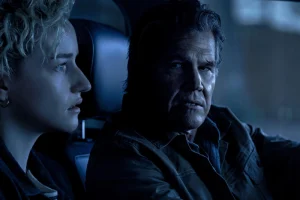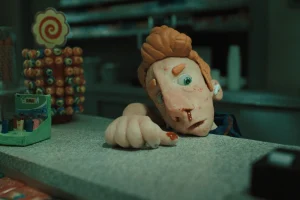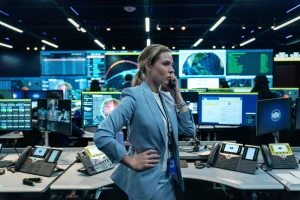The Crawley family faces public disgrace, financial turmoil, and changing times in Downton Abbey: The Grand Finale, opening in Prague and cinemas worldwide this weekend. This third and final Downton Abbey film never really recaptures the magic of the beloved ITV series that ran from 2010-15, but it’s an improvement over the previous two movies, and a fitting—and, at times, moving—sendoff for its memorable cast of characters.
Directed by Simon Curtis from a screenplay by Julian Fellowes, Downton Abbey: The Grand Finale won’t win over any new converts, and the sheer number of primary cast members who frequent the screen may make it difficult to approach for returning viewers without a great long-term memory. But this one regains focus after the meandering previous two entries, and delivers a grand finale that does justice to its sprawling cast, including those who have not survived the series.
At the heart of The Grand Finale is the reluctantly aging Robert Crawley, Earl of Grantham (Hugh Bonneville), who has pledged to hand over the reins of the titular estate to his eldest daughter, Lady Mary Crawley (Michelle Dockery), but is finding it difficult to let things go, despite the gentle urging of his wife Cora (Elizabeth McGovern). Also at the Downton Abbey table are the Crawley’s second daughter Edith Pelham (Laura Carmichael), and her husband Herbert Bertie (Harry Hadden-Paton)
But scandal leaps into the lives of Crawleys when it becomes public that Mary—you may want to sit to read this—has gotten divorced from husband Henry, who was played by Matthew Goode in the series and the first film but has been absent from the past two. This shocking development will form the central element that most of the The Grand Finale‘s narrative threads hang from, and while it was certainly a genuine concern among England’s elite in 1930, we really couldn’t care less.
Nor could any of Downton Abbey’s many returning characters, most of whom are filtered through a somewhat modern sensibility. It’s only the oft-mentioned but never-seen neighbors that the Crawleys must contend with, as well two featured antagonists: Lady Petersfield (Joely Richardson), who unceremoniously boots Mary from her party after getting wind of her divorce, and Sir Hector Moreland (Simon Russell Beale), who is organizing the local fair alongside Lady Merton (Penelope Wilton) and virulently bristles at mention of Mary’s attendance. These two characters could have been pulled from the Marx Brothers’ Night at the Opera, and are delightfully served comeuppance in this otherwise serious-minded affair.
The Crawleys have more to contend with following the appearance of Cora’s brother Harold (Paul Giamatti, making a welcome return to the series after a brief appearance in season 4), who brings news from New York of financial misfortunate. He also brings a mysterious ‘financial advisor’ in the form of Gus Sambrook (a subdued Alessandro Nivola), who insists on being present for the family’s financial discussions; no prizes for guessing his true intentions.
Returning from Downton Abbey: A New Era‘s moviemaking plotline is actor Guy Dexter (Dominic West), whose dresser Thomas Barrow (Robert James-Collier) was a former Downton Abbey butler; here, they’re joined by a high-profile guest in playwright Noel Coward (Arty Froushan), whose mere presence as a guest at Downton Abbey is enough to win over neighborly support for Mary in the wake of her scandalous divorce.
And then, of course, there’s all the staff that keep Downton Abbey running, from retiring butler Charlie Carson (Jim Carter) and cook Beryl Patmore (Lesley Nicol) to their married replacements Andy (Michael Fox) and Daisy Parker (Sophie McShera), as well as characters like Lord Grantham’s valet John Bates (Brendan Coyle) and his wife, Mary’s maid Anna (Joanne Froggatt).
Afforded more screen time in the earlier TV series, there was a tone-deaf presentation to those living a life of servitude in the past two films that has been largely rectified here; a Downton Abbey movie was never going to be a social polemic along the lines of Poor Things, but a little self-awareness goes a long way. A subplot featuring former footman Joseph Molesley (Kevin Doyle) and his wife Phyllis Baxter (Raquel Cassidy), Lady Grantham’s maid, nicely captures the contrasting ambition of those outside of the ruling class.
After five seasons on TV and three big-screen outings over the course of the past fifteen years, Downton Abbey: The Grand Finale shows how much capable writing and steady direction from series veterans can still matter. Curtis and Fellowes know these characters intimately, and their restraint pays off, keeping the film rooted in the kind of family drama and wry humor that made the series resonate in the first place.
The production also represents the very best Downton has ever looked. Cinematographer Ben Smithard frames the Yorkshire estate with a grandeur that feels appropriately elegiac, while the performances across the ensemble remain enigmatic and lived-in. Each actor carries the weight of history in their role, whether on the side of aristocracy or service.
Downton Abbey: The Grand Final is ultimately a fitting sendoff—not just for the Crawleys and their household, but also for those who have left the series behind. The film is dedicated to the late Maggie Smith, whose Dowager Countess defined much of Downton’s wit, while Dan Stevens‘ Matthew Crawley, whose shadow still lingers over the series, is touchingly remembered with a final goodbye.















